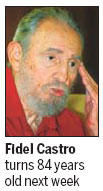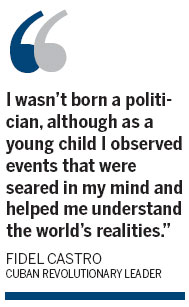Castro tells of rebel shaped by childhood
Cuban leader says exposure to injustice had a lasting effect
HAVANA - Cuban revolutionary leader Fidel Castro says his childhood struggle against unjust authority turned him into a rebel and revolutionary, in extracts of his upcoming autobiography published online by Cubadebate.com.
"I wasn't born a politician, although as a young child I observed events that were seared in my mind and helped me understand the world's realities," said Castro in The Strategic Victory, one week before his 84th birthday.
Four years after stepping down as president to undergo a delicate gastrointestinal operation and passing the helm to his younger brother Raul, 79, Castro has recovered enough to appear in public and writes regularly and extensively in official newspapers and websites.

In the first part of his two-part autobiography - he said he is busy writing the second installment - Castro reminisces about home life in eastern Biran, and how his childhood and adolescence shaped his spirit and mind.
In a 6,500-word chapter of his autobiography, which as yet has no publishing date, Castro covers his experience from birth to his religious schooling with the Jesuits, and his time studying law in Havana University, where he says his political life began in earnest.
He said his first recollection of "consciously" rebelling was when he was going hungry at a teacher's house where he went for pre-schooling, and later, when at 11 years of age he threw a piece of buttered bread at a teacher who hit him in class.
"I threw it in his face... and then I struck him with my hands and feet in such a way, in front of all the schoolchildren... that his authority and abusive ways left him discredited.
"It was an event that school remembered for a long time."

Castro also remembers sending a letter "full of admiration" to then-US president Franklin Delano Roosevelt, for which he received an acknowledgment message from the US Embassy in Havana.
He said he was good at writing, better still at math, an excellent athlete and a gun lover from early in life.
Conspicuously absent are details of his love life, except for his recollection of the time he cried on a beach in front of a girlfriend after some bullies blocked him at the university door.
"I knew the enemy was beyond tolerance. In my quixotic mind, there was no alternative left but to face the threat. I could get hold of a gun and I would keep it on me," Castro said.
"I was overtaken by a spirit of competition and perhaps self-sufficiency and vanity so common with many young men, even in our times," he added.
Castro says he was among the few who dared dream of revolution at a time when "the empire" (United States) was growing.
"But nobody can take individual credit in a heroic deed that was a blend of ideas, events and sacrifices of many people.
"With those ingredients, we were able to conquer Cuba's full independence and (establish) a social revolution that has honorably withstood more than 50 years of attacks and a blockade by the United States."
Still at the helm of the Cuban Communist Party, Castro said he has "indelible" memories of the circumstances that turned him into a guerrilla fighter.
Agence France-Presse
(China Daily 08/07/2010 page6)








